Ulysses S. Grant
Ulysses S. Grant served as U.S. general and commander of the Union armies during the late years of the American Civil War, later becoming the 18th U.S. president.
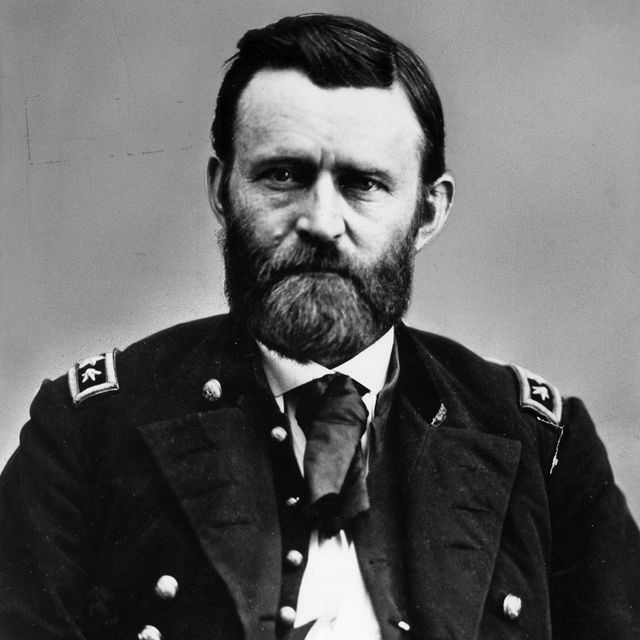
(1822-1885)

Who Was Ulysses S. Grant?
Quick facts.
FULL NAME: Hiram Ulysses Grant BORN: April 27, 1822 DIED: July 23, 1885 BIRTHPLACE: Point Pleasant, Ohio SPOUSE: Julia Dent (1848-1885) CHILDREN: Frederick, Ulysses Jr., Ellen, Jesse ASTROLOGICAL SIGN: Taurus
Early Years
Origins of “u.s.” grant nickname.
His famous moniker, "U.S. Grant," came after he joined the military.
Grant was born Hiram Ulysses and went by Ulysses as a child. However, when he arrived at West Point, he expected to be listed on the sheet of incoming cadets by his birth name and was surprised to learn there was no H.U. Grant on the roll call but a U.S. Grant. The clerical error had been made by the Ohio Congressman who nominated Grant to West Point, who may have accidentally combined Grant’s middle name with his mother’s maiden name, Simpson.
Not wanting to make a fuss as a new arrival at West Point and risk being rejected, Grant agreed to go along with the name change but later joked that the “S” in his name stood for nothing. Fellow soldiers at West Point called the newly christened U.S. Grant “Sam,” a shortened version of Uncle Sam.
Wife and Family
After graduation from West Point, Lieutenant Grant was stationed in St. Louis, Missouri, where he met his future wife, Julia Dent, the sister of Grant’s West Point roommate. Grant proposed marriage in 1844, but both families were unhappy with the match. Grant’s abolitionist father disapproved of the Dents owning enslaved people, and Julia’s father considered Grant a low-paid soldier with little prospect of financial success.
The couple initially kept their engagement secret, but Grant eventually won over Julia’s father, and the pair received permission to marry. Their plans were interrupted by the outbreak of the Mexican-American War, which led to a nearly four-year separation. They finally wed in 1848 and would have four children: Frederick (1850), Ulysses Jr., known as “Buck" (1852), Ellen, known as “Nellie” (1855), and Jesse (1858).
The Grants were a close couple, and the frequent separations early in the marriage due to Grant’s military postings affected them both, particularly Ulysses, whose loneliness and isolation from his family likely exacerbated his drinking. During Grant’s Civil War service, Julia often visited him at army camps, sometimes bringing their children. When Grant became president, she bloomed into a popular first lady, hosting social receptions while remaining a close advisor to her husband, even meeting with cabinet members and politicians.
Early Military Career
During the Mexican-American War , Grant served as a quartermaster, efficiently overseeing the movement of supplies. Serving under General Zachary Taylor and later under General Winfield Scott, he closely observed their military tactics and leadership skills. After getting the opportunity to lead a company into combat, Grant was credited for his bravery under fire. He also developed strong feelings that the war was wrong and that it was being waged only to increase America's territory for the spread of slavery.
In 1852, he was sent to Fort Vancouver, in what is now Washington State. He missed Dent and his two sons—the second of whom he had not yet seen at this time—and thusly became involved in several failed business ventures to get his family to the coast, closer to him.
He began to drink, not unlike other soldiers—and many other Americans—in an era where alcohol consumption rates were much higher than today. Grant’s thin frame and small stature meant he showed the effects of alcohol quicker than many others. Grant developed a reputation for drinking that dogged him throughout his military career. Still, most of these episodes occurred, especially in the early years of his service, when he was separated from his family and sent to ever-more isolated army postings that left him bored and lonely with little else to do.
In the summer of 1853, Grant was promoted to captain and transferred to Fort Humboldt on the Northern California coast, where he had a run-in with the fort's commanding officer, Lieutenant Colonel Robert C. Buchanan. On July 31, 1854, Grant resigned from the Army amid allegations of heavy drinking and warnings of disciplinary action.
In 1854, Grant moved his family back to Missouri, but the return to civilian life led him to a low point. He tried to farm land given to him by his father-in-law, but this venture proved unsuccessful after a few years. Grant then failed to find success with a real estate venture and was denied employment as an engineer and clerk in St. Louis. To support his family, he was reduced to selling firewood on a St. Louis street. Finally, in 1860, he humbled himself and worked in his father's tannery business as a clerk, supervised by his two younger brothers.
Ulysses S. Grant and Slavery
Like many of his contemporaries, Grant’s involvement with slavery was complicated. An abolitionist father raised him and personally professed his dislike of slavery. But he married the daughter of a slave-holding plantation owner, and the Dent family’s enslaved population often worked alongside Grant at the farm he built on land given to him by his father-in-law. In the late 1850s, he was transferred ownership of an enslaved man, William Jones. In 1859, Grant freed Jones despite severe financial difficulties that might otherwise have led him to sell Jones for a profit.
While Grant’s service in the Civil War was initially inspired by his desire to defend and reunite the Union, he supported Abraham Lincoln’s decision to issue the Emancipation Proclamation, which freed enslaved peoples in Confederate states that had seceded. When the Proclamation went into effect in January 1863, Grant ensured the newly freed formerly enslaved were cared for when they reached Union lines and encouraged Lincoln to allow formerly enslaved men to join the Union Army, which he believed would significantly weaken the Confederate cause.
American Civil War
On April 12, 1861, Confederate troops attacked Fort Sumter in Charleston Harbor, South Carolina. This rebellion sparked Grant's patriotism, and he volunteered his military service. Again, he was initially rejected for positions, but with the aid of an Illinois congressman, he was appointed a colonel and took command of an unruly 21st Illinois volunteer regiment. Applying lessons he'd learned from his commanders during the Mexican-American War, Grant saw that the regiment was combat-ready by September 1861. By that point, he had been promoted to brigadier general.
When Kentucky's fragile neutrality fell apart in the fall of 1861, Grant and his volunteers took the small town of Paducah, Kentucky, at the mouth of the Tennessee River. In February 1862, in a joint operation with the U.S. Navy, Grant's ground forces applied pressure on Fort Henry and Fort Donelson, taking them both. These battles are the earliest significant Union victories of the American Civil War. After the assault on Fort Donelson, Grant earned the moniker "Unconditional Surrender Grant" and was promoted to major general of volunteers.
READ MORE: How Ulysses S. Grant Earned the Nickname "Unconditional Surrender Grant"
Battle of Shiloh
In April 1862, Grant moved his army cautiously into enemy territory in Tennessee in what would later become known as the Battle of Shiloh (or the Battle of Pittsburg Landing), one of the Civil War's bloodiest battles. Confederate commanders Albert Sidney Johnston and P.G.T. Beauregard led a surprise attack against Grant's forces, with fierce fighting occurring at an area known as the "Hornets' Nest" during the first wave of assault. Confederate General Johnston was mortally wounded, and his second-in-command, General Beauregard, decided against a night assault on Grant's forces. Reinforcement finally arrived, and Grant defeated the Confederates during the second day of battle.
The Battle of Shiloh proved to be a watershed for the American military and a near disaster for Grant. Though President Abraham Lincoln supported him, Grant faced heavy criticism from members of Congress and the military brass for the high casualties, and for a time, he was demoted. A war department investigation led to his reinstatement.
Vicksburg Siege
The Union war strategy called for taking control of the Mississippi River and cutting the Confederacy in half. In December 1862, Grant moved overland to take Vicksburg —a key fortress city of the Confederacy—but Confederate cavalry raider Nathan Bedford Forest stalled his attack due to getting bogged down in the bayous north of Vicksburg. In his second attempt, Grant cut some, but not all, of his supply lines, moved his men down the western bank of the Mississippi River, and crossed south of Vicksburg. Failing to take the city after several assaults, he settled into a long siege, and Vicksburg finally surrendered on July 4, 1863. Grant was named major general of the regular U.S. Army.
Though Vicksburg marked Grant's most outstanding achievement thus far and a morale boost for the Union, rumors of Grant's heavy drinking followed him through the rest of the Western Campaign. Grant suffered from intense migraine headaches due to stress, which nearly disabled him and only helped to spread rumors of his drinking, as many chalked up his migraines to frequent hangovers. However, his closest associates said that he was sober and polite and displayed deep concentration, even amid a battle. When confronted by these rumors, President Abraham Lincoln was unperturbed, reportedly offering to send a case of Grant’s favorite whisky to other Union generals in the hope of achieving Grant’s stunning military results.
Battle for Chattanooga
In January 1863, the Emancipation Proclamation went into effect, freeing enslaved peoples in the Confederate states that had seceded from the Union.
In October 1863, Grant took command at Chattanooga, Tennessee. The following month, from November 22 to November 25, Union forces routed Confederate troops in Tennessee at the battles of Lookout Mountain and Missionary Ridge, known collectively as the Battle of Chattanooga . The victories forced the Confederates to retreat into Georgia, ending the siege of the vital railroad junction of Chattanooga—and ultimately paving the way for Union General William Tecumseh Sherman 's Atlanta campaign and march to Savannah, Georgia, in 1864.
Union Victory
Grant saw the military objectives of the Civil War differently than most of his predecessors, who believed that capturing territory was most important to winning the war. Grant adamantly believed that taking down the Confederate armies was most important to the war effort and, to that end, set out to track down and destroy General Robert E. Lee's Army of Northern Virginia.
In March 1864, Grant was named lieutenant general of the U.S. Army (the first person to achieve this rank since George Washington) and given command of all U.S. armies. He quickly set out to congruent Lee, and from March 1864 until April 1865, Grant doggedly hunted for Lee in the forests of Virginia, all the while inflicting unsustainable casualties on Lee's army.
On April 9, 1865, Lee surrendered his army, marking the end of the Civil War. The two generals met at a farm near the village of Appomattox Court House, and a peace agreement was signed. In a generous gesture, Grant allowed Lee's men to keep their horses and return to their homes, taking none of them as prisoners of war.
During the post-war reorganization, Grant was promoted to full general and oversaw the military portion of Reconstruction . In 1867, Grant was caught up in a scandal involving Republican Andrew Johnson's fight with the Radical Republican wing of his party. Johnson tried to remove his Secretary of War, who had often sided with the Radical Republican wing over the more robust implementation of Reconstruction in the South and initially tried to replace him, Grant, all without the necessary Congressional approval. During the subsequent uproar, Grant resigned from the position. Still, Johnson’s determination to proceed with his plan with a different appointee made him the first U.S. president to be impeached.
Despite having never been elected to any previous political office, in 1868, Grant ran for president on the Republican ticket and was elected the 18th president of the United States. When he entered the White House the following year, Grant was not only politically inexperienced but also—at the age of 46—the youngest president theretofore.
Grant had many achievements as president, pushing through ratification of the 15th Amendment , creating the forerunner to the National Weather Service and America’s first national park (Yellowstone), instituting the first Civil Service Commission (aimed at replacing the corrupt patronage system that controlled many government jobs), working with Native American leaders to develop a peace plan in the West and naming Eli Parker as the first Native American head of the Bureau of Indian Affairs. Grant also oversaw the creation of the U.S. Justice Department, using the new department, in part, to help strengthen and enforce laws aimed at curbing the rise of the newly formed Ku Klux Klan.
However, Grant’s administration faced numerous setbacks, including a prolonged economic depression in 1873. Though scrupulously honest, Grant became known for appointing people who were not of good character, and his presidency today is often more remembered for its notable scandals than its successes. In 1869, two Wall Street speculators (whom Grant knew from before becoming president) attempted to corner the gold market and ensnare Grant in their scheme, leading to a financial panic. In 1875, Grant’s private secretary was embroiled in a scandal that intended to deprive the federal government of millions of dollars in revenues from liquor taxes, and even Grant’s brother was later involved in a kickback scheme involving military contracts. By the end of his second term, several members of Grant’s cabinet had been accused of taking bribes. Grant called for proper legal investigations for those involved, and during his final address to Congress in 1876, he discussed his lack of political experience upon entering the office and the resulting issues during his presidency, noting , “Failures have been errors of judgment, not of intent.”
Final Years and Death
After leaving the White House, Grant's lack of success in civilian life continued once again. He became a partner of the financial firm Grant and Ward only to have his partner, Ferdinand Ward, embezzle investors' money. The firm went bankrupt in 1884, as did Grant. That same year, Grant learned that he had throat cancer, and though his military pension was reinstated, he was strapped for cash.
Grant began selling short magazine articles about his life and then negotiated a contract with a friend, famed novelist Mark Twain , to publish his memoirs. The two-volume set sold 300,000 copies, becoming a classic work of American literature. Ultimately, the work earned Grant's family nearly $450,000.
READ MORE: The Unlikely Friendship of Mark Twain and Ulysses S. Grant
Grant died on July 23, 1885—just as his memoirs were being published—at 63, in Mount McGregor, New York. He was buried in New York City, with more than 1.5 million attending his funeral. His temporary burial site was greatly expanded and became popularly known as Grant’s Tomb, the largest mausoleum in North America. In 1914, Grant became the face of the U.S. Treasury’s $50 bill, and in 1922, to mark the centennial of his birth, the U.S. Mint released gold dollars and silver half dollars featuring Grant, partly to raise funds to preserve his Ohio birthplace.
Grant’s reputation has seen notable shifts over time. While many of his contemporary Americans lauded him for his Civil War service and liked Grant personally, the scandals surrounding his presidency led him to be ranked among the most unsuccessful presidents in history. Historians and writers began reappraising Grant's legacy in the late 20th and early 21st centuries. They noted his success in preserving the Union in the post-war years that saw it roiled by debates over the federal government’s role in southern Reconstruction. He has been lauded for his attempted civil service reforms, his vigorous defense of the civil liberties of African Americans, and his policy towards Native Americans (Grant favored giving them American citizenship nearly 50 years before that became a reality). A highly skilled military commander, Grant could not translate those talents to the presidency, with both his personal and political naivete regarding those surrounding him obscuring his notable achievements.
- Whatever may have been my political opinions before, I have but one sentiment now. That is, we have a government, and laws and a flag and they must all be sustained.
- I have never advocated war except as a means of peace.
- [My] failures have been errors of judgment, not of intent.
- A verb is anything that signifies to be; to do; to suffer; I signify all three.
- It occurred to me at once that [my enemy] had been as much afraid of me as I had been of him. This was a view of the question I had never taken before; but it was one I never forgot afterwards.
- I know no method to secure the repeal of bad or obnoxious laws so effective as their stringent execution.
- I never wanted to get out of a place as much as I did to get out of the presidency.
- No terms except an unconditional and immediate surrender can be accepted.
- I don't know anything of party politics, and I don't want to.
- I know only two tunes: One of them is 'Yankee Doodle' and the other isn't.
- The art of war is simple enough. Find out where your enemy is. Get at him as soon as you can. Strike him as hard as you can, and keep moving on.
- I can't spare this man—he fights.
Fact Check: We strive for accuracy and fairness. If you see something that doesn’t look right, contact us !
The Biography.com staff is a team of people-obsessed and news-hungry editors with decades of collective experience. We have worked as daily newspaper reporters, major national magazine editors, and as editors-in-chief of regional media publications. Among our ranks are book authors and award-winning journalists. Our staff also works with freelance writers, researchers, and other contributors to produce the smart, compelling profiles and articles you see on our site. To meet the team, visit our About Us page: https://www.biography.com/about/a43602329/about-us
U.S. Presidents

Oppenheimer and Truman Met Once. It Went Badly.

Who Killed JFK? You Won’t Believe Us Anyway
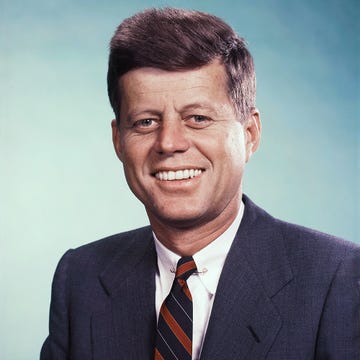
John F. Kennedy
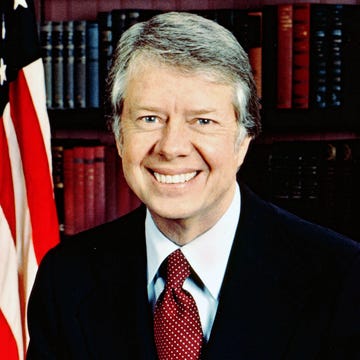
Jimmy Carter
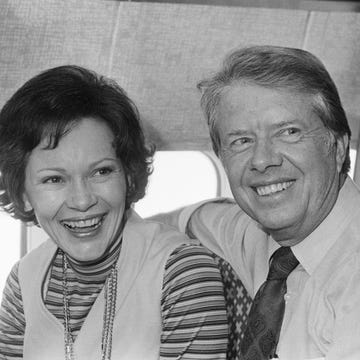
Inside Jimmy and Rosalynn Carter’s 77-Year Love
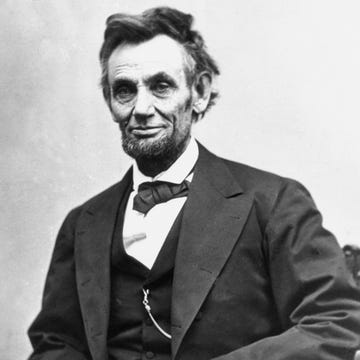
Abraham Lincoln
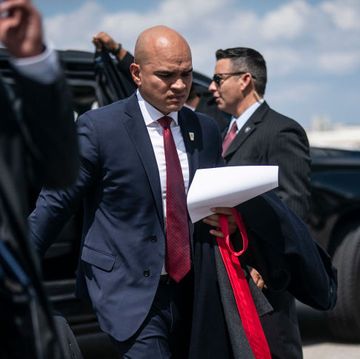
Who Is Walt Nauta, the Man Indicted with Trump?
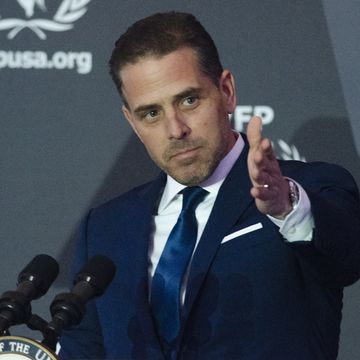
Hunter Biden and Other Presidential Problem Kids

Controversial Judge Aileen Cannon Not Out Just Yet
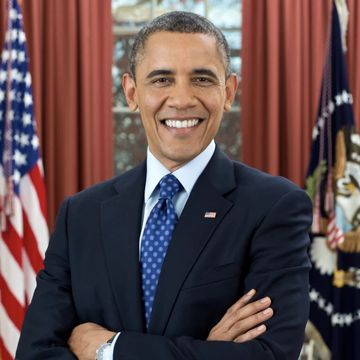
Barack Obama
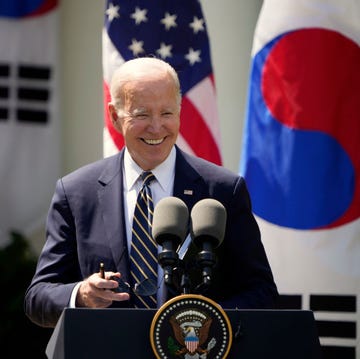
10 Celebrities the Same Age as President Joe Biden
- History Classics
- Your Profile
- Find History on Facebook (Opens in a new window)
- Find History on Twitter (Opens in a new window)
- Find History on YouTube (Opens in a new window)
- Find History on Instagram (Opens in a new window)
- Find History on TikTok (Opens in a new window)
- This Day In History
- History Podcasts
- History Vault
Ulysses S. Grant
By: History.com Editors
Updated: March 30, 2020 | Original: October 29, 2009

Ulysses Grant (1822-1885) commanded the victorious Union army during the American Civil War (1861-1865) and served as the 18th U.S. president from 1869 to 1877. An Ohio native, Grant graduated from West Point and fought in the Mexican-American War (1846-1848). During the Civil War, Grant, an aggressive and determined leader, was given command of all the U.S. armies.
After the war, he became a national hero, and the Republicans nominated him for president in 1868. A primary focus of Grant’s administration was Reconstruction, and he worked to reconcile the North and South while also attempting to protect the civil rights of newly freed black slaves. While Grant was personally honest, some of his associates were corrupt and his administration was tarnished by various scandals. After retiring, Grant invested in a brokerage firm that went bankrupt, costing him his life savings. He spent his final days penning his memoirs, which were published the year he died and proved a critical and financial success.
Ulysses Grant’s Early Years
Hiram Ulysses Grant was born on April 27, 1822, in Point Pleasant, Ohio . The following year, he moved with his parents, Jesse Grant (1794-1873) and Hannah Simpson Grant (1798-1883), to Georgetown, Ohio, where his father ran a tannery.
Did you know? Thousands of people worldwide donated a total of $600,000 for the construction of Grant's tomb in New York City. Known officially as the General Grant National Memorial, it is America's largest mausoleum and was dedicated on April 27, 1897, the 75th anniversary of Grant's birth.
In 1839, Jesse Grant arranged for his son’s admission to the U.S. Military Academy at West Point . The congressman who appointed Grant mistakenly believed his first name was Ulysses and his middle name was Simpson (his mother’s maiden name). Grant never amended the error and went on to accept Ulysses S. Grant as his real name, although he maintained that the “S” did not stand for anything.
In 1843, Grant graduated from West Point, where he was known as a skilled horseman but an otherwise undistinguished student. He was commissioned as a brevet second lieutenant in the 4th U.S. Infantry, which was stationed at Jefferson Barracks, Missouri , near St. Louis. The following year, he met Julia Dent (1826-1902), the sister of one of his West Point classmates and the daughter of a merchant and planter.
After seeing action in the Mexican-American War , Grant returned to Missouri and married Julia in August 1848. The couple eventually had four children: Frederick Dent Grant, Ulysses S. Grant, Jr., Nellie Grant and Jesse Root Grant. In the early years of his marriage, Grant was assigned to a series of remote army posts, some of them on the West Coast, which kept him separated from his family. In 1854, he resigned from the military.
Ulysses Grant and the Civil War
Now a civilian, Ulysses Grant was reunited with his family at White Haven, the Missouri plantation where Julia had grown up. There he made an unsuccessful attempt at farming, followed by a failed stint in a St. Louis real estate office. In 1860, the Grants moved to Galena, Illinois , where Ulysses worked in his father’s leather goods business.
After the Civil War began in April 1861, Grant became a colonel of the 21st Illinois Volunteers. Later that summer, President Abraham Lincoln (1809-1865) made Grant a brigadier general. Grant’s first major victory came in February 1862, when his troops captured Fort Donelson in Tennessee . When the Confederate general in charge of the fort asked about terms of surrender for the Battle of Fort Donelson , Grant famously replied, “No terms except an unconditional and immediate surrender can be accepted.”
In July 1863, Grant’s forces captured Vicksburg, Mississippi , a Confederate stronghold. Grant, who was earning a reputation as a tenacious and determined leader, was appointed lieutenant-general by Lincoln on March 10, 1864, and given command of all U.S. armies. He led a series of campaigns that ultimately wore down the Confederate army and helped bring the deadliest conflict in U.S. history to a close. On April 9, 1865, Confederate General Robert Lee (1807-1870) surrendered to Grant at Appomattox Court House in Virginia , effectively ending the Civil War.
Five days later, on April 14, Lincoln was assassinated by Confederate sympathizer John Wilkes Booth (1838-1865) while attending a play at Ford’s Theatre in Washington, D.C. Grant, and his wife had been invited to accompany the president that night but declined in order to visit family.

Ulysses S. Grant: An Interactive Map of His Key Civil War Battles
Grant is credited with winning the Civil War and preserving the American Union. This map charts his achievements during the nation’s most wrenching conflict.
From War Hero to President
Following the war, Ulysses Grant became a national hero, and in 1866 was appointed America’s first four-star general at the recommendation of President Andrew Johnson (1808-1875). By the summer of 1867, tensions were running high between Johnson and the Radical Republicans in Congress, who favored a more aggressive approach to Reconstruction in the South.
The president removed a vocal critic of his policies, Secretary of War Edwin Stanton (1814-1869), from the Cabinet and replaced him with Grant. Congress charged that Johnson was in violation of the Tenure of Office Act and demanded Stanton’s reinstatement. In January 1868, Grant resigned the war post, thereby breaking with Johnson, who was later impeached but acquitted by a single vote in May 1868.
That same month, the Republicans nominated Grant as their presidential candidate, selecting Schuyler Colfax (1823-1885), a U.S. congressman from Indiana , as his running mate. The Democrats chose former New York governor Horatio Seymour (1810-1886) as their presidential nominee, paired with Francis Blair (1821-1875), a U.S. congressman from Missouri. In the general election, Grant won by an electoral margin of 214-80 and received more than 52 percent of the popular vote. At age 46, he became the youngest president-elect in U.S. history up to that time.
Ulysses Grant in the White House
Ulysses Grant entered the White House in the middle of the Reconstruction era, a tumultuous period in which the 11 Southern states that seceded before or at the start of the Civil War were brought back into the Union. As president, Grant tried to foster a peaceful reconciliation between the North and South. He supported pardons for former Confederate leaders while also attempting to protect the civil rights of freed slaves.
In 1870, the 15th Amendment , which gave black men the right to vote, was ratified. Grant signed legislation aimed at limiting the activities of white terrorist groups like the Ku Klux Klan that used violence to intimidate blacks and prevent them from voting. At various times, the president stationed federal troops throughout the South to maintain law and order. Critics charged that Grant’s actions violated states’ rights, while others contended that the president did not do enough to protect freedmen.
In addition to focusing on Reconstruction, Grant signed legislation establishing the Department of Justice, the Weather Bureau (now known as the National Weather Service) and Yellowstone National Park, America’s first national park. He also tried, with limited success, to improve conditions for Native Americans.
Grant’s administration made strides in foreign policy by negotiating the 1871 Treaty of Washington, which settled U.S. claims against England stemming from the activities of British-built Confederate warships that disrupted Northern shipping during the Civil War. The treaty resulted in improved relations between the United Kingdom and the United States. Less successful was Grant’s failed attempt to annex the Caribbean nation of Santo Domingo (present-day Dominican Republic).
In 1872, a group of Republicans who opposed Grant’s policies and believed he was corrupt formed the Liberal Republican Party. The group nominated New York newspaper editor Horace Greeley (1811-1872) as their presidential candidate. The Democrats also nominated Greeley, hoping the combined support would defeat Grant. Instead, the president and his running mate Henry Wilson (1812-1875), a U.S. senator from Massachusetts , won the general election by an electoral margin of 286-66 and received close to 56 percent of the popular vote.
During Grant’s second term, he had to contend with a lengthy and severe depression that struck the nation in 1873 as well as various scandals that plagued his administration. He also continued to grapple with issues related to Reconstruction. Grant did not seek a third term, and Republican Rutherford Hayes (1822-1893), the governor of Ohio, won the presidency in 1876.
Ulysses Grant Scandals
Ulysses Grant’s time in office was marked by scandal and corruption, although he himself did not participate in or profit from the misdeeds perpetrated by some of his associates and appointees. During his first term, a group of speculators led by James Fisk (1835-1872) and Jay Gould (1836-1892) attempted to influence the government and manipulate the gold market. The failed plot resulted in a financial panic on September 24, 1869, known as Black Friday. Even though Grant was not directly involved in the scheme, his reputation suffered because he had become personally associated with Fisk and Gould prior to the scandal.
Another major scandal was the Whiskey Ring, which was exposed in 1875 and involved a network of distillers, distributors and public officials who conspired to defraud the federal government of millions in liquor tax revenue. Grant’s private secretary, Orville Babcock (1835-1884), was indicted in the scandal; however, the president defended him and he was acquitted.
Grant’s presidency occurred during an era dominated by machine politics and the patronage system of political appointments, in which politicians rewarded their supporters with government jobs and the employees, in turn, kicked back part of their salaries to the political party. In order to combat the corruption and inefficiency that resulted from this system, Grant established a civil service commission to develop more equitable methods for hiring and promoting government workers. However, civil service reform faced opposition from Congress and members of Grant’s administration, and by 1876 the commission’s funding was cut off and reform rules such as standardized exams were discontinued. Lasting reform did not take hold until 1883 when President Chester Arthur (1829-1886) signed the Pendleton Civil Service Act.
Ulysses Grant’s Later Years
After leaving the White House in March 1877, Ulysses Grant and his family embarked on a two-year trip around the world, during which they met with dignitaries and cheering crowds in many of the countries they visited. At the 1880 Republican National Convention, a group of delegates voted to nominate Grant for president again; however, James Garfield (1831-1881), a U.S. congressman from Ohio, ultimately earned the nomination. He would go on to win the general election and become the 20th U.S. president before being assassinated in 1881.
In 1881, Grant bought a brownstone on New York City’s Upper East Side. He invested his savings in a financial firm in which his son was a partner; however, the firm’s other partner swindled its investors in 1884, causing the business to collapse and bankrupt Grant. To provide for his family, the former president decided to write his memoirs. In late 1884, he was diagnosed with throat cancer.
Grant died at age 63 on July 23, 1885, in Mount McGregor, New York, in the Adirondack Mountains, where he and his family were spending the summer. His memoirs, published that same year by his friend Mark Twain (1835-1910), became a major financial success.
More than a million people gathered in New York City to witness Grant’s funeral procession. The former president was laid to rest in a tomb in New York City’s Riverside Park. When Julia Grant died in 1902, she was buried beside her husband.
Ulysses Grant Quotes
“The friend in my adversity I shall always cherish most. I can better trust those who have helped to relieve the gloom of my dark hours than those who are so ready to enjoy with me the sunshine of my prosperity.”
“In every battle there comes a time when both sides consider themselves beaten. Then he who continues the attack wins.”
“There are but few important events in the affairs of men brought about by their own choice.”
“The art of war is simple enough. Find out where your enemy is. Get at him as soon as you can. Strike him as hard as you can, and keep moving on.”

Sign up for Inside History
Get HISTORY’s most fascinating stories delivered to your inbox three times a week.
By submitting your information, you agree to receive emails from HISTORY and A+E Networks. You can opt out at any time. You must be 16 years or older and a resident of the United States.
More details : Privacy Notice | Terms of Use | Contact Us
Mobile Menu Overlay
The White House 1600 Pennsylvania Ave NW Washington, DC 20500
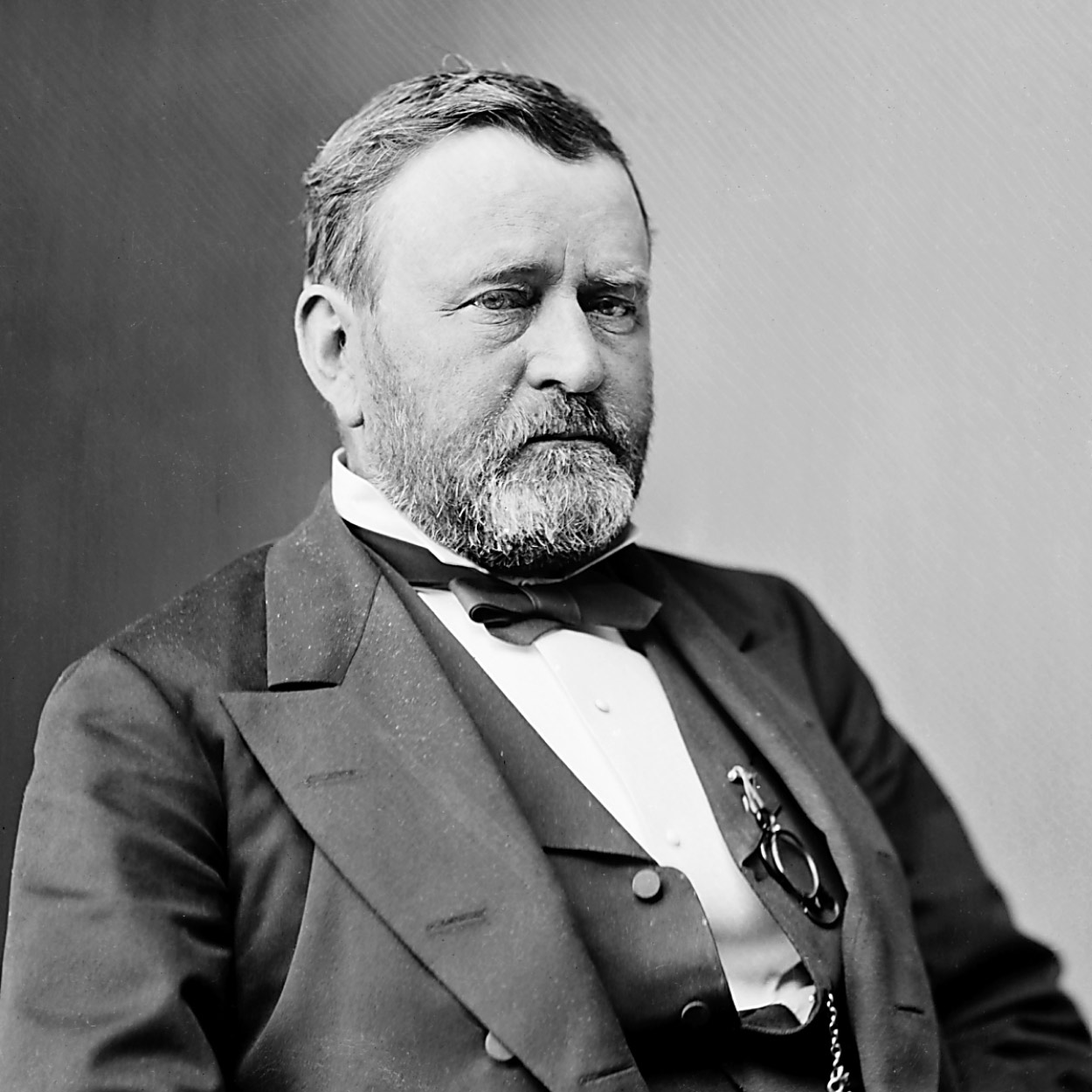
Ulysses S. Grant
The 18th President of the United States
The biography for President Grant and past presidents is courtesy of the White House Historical Association.
In 1865, as commanding general, Ulysses S. Grant led the Union Armies to victory over the Confederacy in the American Civil War. As an American hero, Grant was later elected the 18th President of the United States (1869–1877), working to implement Congressional Reconstruction and to remove the vestiges of slavery.
Late in the administration of Andrew Johnson, Gen. Ulysses S. Grant quarreled with the President and aligned himself with the Radical Republicans. He was, as the symbol of Union victory during the Civil War, their logical candidate for President in 1868.
When he was elected, the American people hoped for an end to turmoil. Grant provided neither vigor nor reform. Looking to Congress for direction, he seemed bewildered. One visitor to the White House noted “a puzzled pathos, as of a man with a problem before him of which he does not understand the terms.”
Born in 1822, Grant was the son of an Ohio tanner. He went to West Point rather against his will and graduated in the middle of his class. In the Mexican War he fought under Gen. Zachary Taylor.
At the outbreak of the Civil War, Grant was working in his father’s leather store in Galena, Illinois. He was appointed by the Governor to command an unruly volunteer regiment. Grant whipped it into shape and by September 1861 he had risen to the rank of brigadier general of volunteers.
He sought to win control of the Mississippi Valley. In February 1862 he took Fort Henry and attacked Fort Donelson. When the Confederate commander asked for terms, Grant replied, “No terms except an unconditional and immediate surrender can be accepted.” The Confederates surrendered, and President Lincoln promoted Grant to major general of volunteers.
At Shiloh in April, Grant fought one of the bloodiest battles in the West and came out less well. President Lincoln fended off demands for his removal by saying, “I can’t spare this man–he fights.”
For his next major objective, Grant maneuvered and fought skillfully to win Vicksburg, the key city on the Mississippi, and thus cut the Confederacy in two. Then he broke the Confederate hold on Chattanooga.
Lincoln appointed him General-in-Chief in March 1864. Grant directed Sherman to drive through the South while he himself, with the Army of the Potomac, pinned down Gen. Robert E. Lee’s Army of Northern Virginia.
Finally, on April 9, 1865, at Appomattox Court House, Lee surrendered. Grant wrote out magnanimous terms of surrender that would prevent treason trials.
As President, Grant presided over the Government much as he had run the Army. Indeed he brought part of his Army staff to the White House.
Although a man of scrupulous honesty, Grant as President accepted handsome presents from admirers. Worse, he allowed himself to be seen with two speculators, Jay Gould and James Fisk. When Grant realized their scheme to corner the market in gold, he authorized the Secretary of the Treasury to sell enough gold to wreck their plans, but the speculation had already wrought havoc with business.
During his campaign for re-election in 1872, Grant was attacked by Liberal Republican reformers. He called them “narrow-headed men,” their eyes so close together that “they can look out of the same gimlet hole without winking.” The General’s friends in the Republican Party came to be known proudly as “the Old Guard.”
Grant allowed Radical Reconstruction to run its course in the South, bolstering it at times with military force.
After retiring from the Presidency, Grant became a partner in a financial firm, which went bankrupt. About that time he learned that he had cancer of the throat. He started writing his recollections to pay off his debts and provide for his family, racing against death to produce a memoir that ultimately earned nearly $450,000. Soon after completing the last page, in 1885, he died.
Learn more about Ulysses S. Grant’s spouse, Julia Dent Grant .
Stay Connected
We'll be in touch with the latest information on how President Biden and his administration are working for the American people, as well as ways you can get involved and help our country build back better.
Opt in to send and receive text messages from President Biden.
Ulysses S. Grant
By jake rossen | mar 13, 2020.
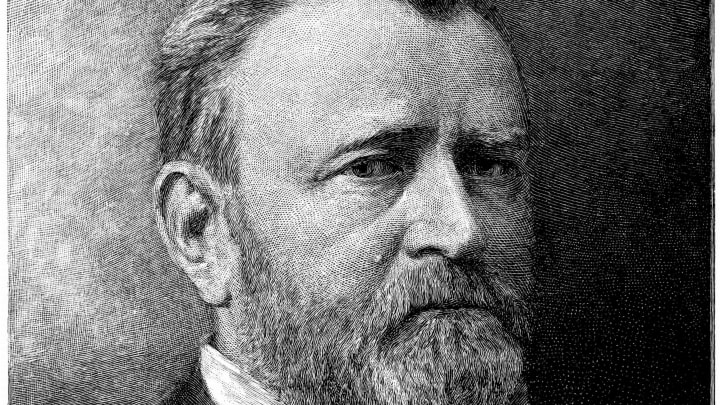
MILITARY (1822–1885); POINT PLEASANT, OHIO
Fresh off his victory as commander of the Union armies during the Civil War, Ulysses S. Grant (1822–1885) became President of the United States in March 1869. While his time in office wasn’t without controversy, Grant has taken his place among the most fascinating of the country’s leaders. Today, you can find him on the $50 bill and the $1 coin that was issued in 2011. For more on Grant, including the mystery of his middle name, keep reading.
1. Ulysses S. Grant’s Civil War victories are legendary.
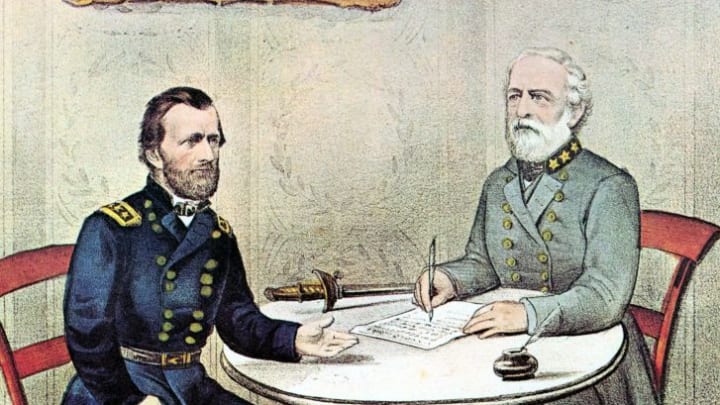
Ulysses Grant was born in Point Pleasant, Ohio, on April 27, 1822, to parents Jesse and Hannah Grant. He was raised in Georgetown, Ohio, and eventually passed on an opportunity to follow his father into the tannery, or leather, business. Instead, he opted to join the United States Military Academy at West Point at the age of 17. After graduating, he wed Julia Dent and served during the Mexican-American War, before resigning from the military in 1854.
But it was the Civil War that made Grant’s name. He returned to the army when the war broke out, starting as commander of the 21st Illinois Volunteers on his way to eventually becoming Commanding General of the United States Army. During the war, Grant earned several major victories on behalf of the Union:
- Grant led the charge in the Battle of Fort Henry in Tennessee in February 1862, scoring the first major Union win in the war.
- Grant also took Fort Donelson that same month, each time forcing Confederates to surrender. Both are credited as being two crucial victories for the Union, allowing them to take control of the Tennessee and Cumberland rivers.
- Grant conquered the Battle of Shiloh in Tennessee in April 1862, said to be among the most violent of the conflict. After two days of fighting and the fatal wounding of Confederate commander Albert Sidney Johnston, the Union beat back Confederate forces.
- In Vicksburg, Mississippi, Grant cut off supplies to Confederates and laid siege to their key city, overwhelming them and breaking their forces into smaller groups. They surrendered on July 4, 1863.
- In November 1863, Grant led Union forces in the Battle of Chattanooga in Tennessee, which included Lookout Mountain and Missionary Ridge. Enemy forces retreated to Georgia, leaving a key railroad junction under Union control.
- Now serving as a lieutenant general of the entire U.S. Army, Grant spent 1864 and 1865 advancing on General Robert E. Lee’s men in Virginia. Losing men rapidly, Lee surrendered on April 9, 1865, ending the war.
2. Ulysses S. Grant had no formal middle name.
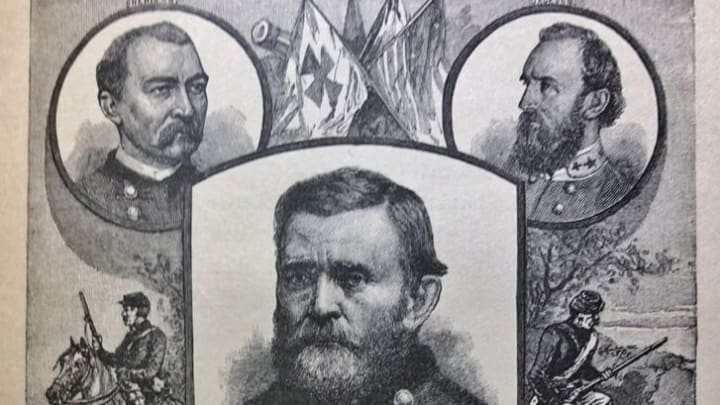
The “S” in Ulysses S. Grant has long invited questions about his middle name. If you don’t recall ever hearing it, that’s because he doesn’t actually have one. Grant was born Hiram Ulysses Grant. When he enlisted in the U.S. Military Academy, a paperwork error had him listed as “Ulysses S. Grant.” Rather than get tied up in the confusion, Grant simply accepted the change in his name. The “S” would later come in handy, as his Civil War victories led to people nicknaming him “U.S. Grant” and “Unconditional Surrender Grant.”

3. Ulysses S. Grant was said to be unflappable.
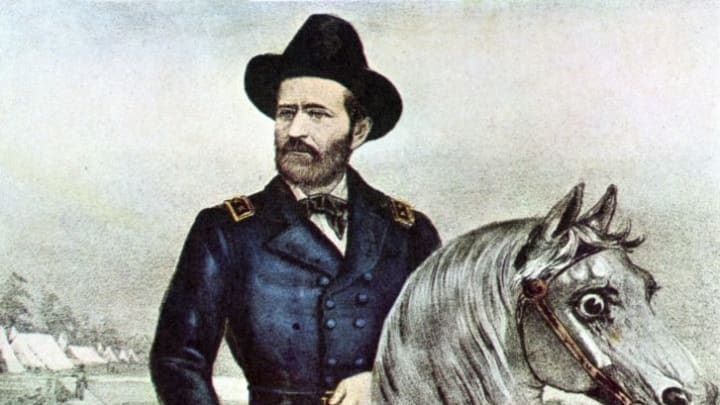
Part of what made Grant such an effective military leader was a seeming sense of impermeability. Grant was said to be very steady and not easily excited. One Union officer who knew him wrote that Grant “habitually wears an expression as if he had determined to drive his head through a brick wall, and was about to do it.” Once, Grant was sitting for a photographer when the photographer’s assistant fell through a skylight. Glass shards fell right next to Grant, who remained sitting, not moving an inch.
4. As president, Ulysses S. Grant was not necessarily the most qualified.
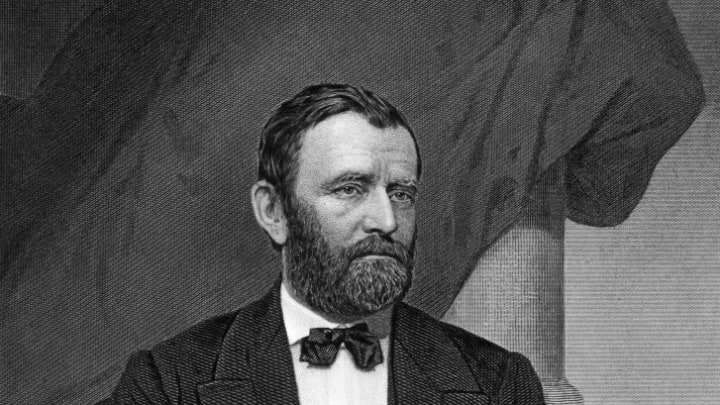
Following his contributions to winning the Civil War, Grant had unmatched support among Union states and Republicans. When then-President Andrew Johnson was impeached following a controversy over the inappropriate firing of Secretary of War Edwin Stanton, Grant was elected to office in 1868. But his history was in military service, not politics, and some felt Grant was lost in the role as a world leader. He was said to look to Congress for guidance, as well as numerous military servicemen he brought to the White House.
Even so, Grant still implemented positive changes while in office. He signed the 15th Amendment to the Constitution, granting black men the right to vote, and supported improved government relations with Native Americans. And in 1872, he signed legislation that named Yellowstone the country’s first national park.
5. Ulysses S. Grant's presidency was not without controversy.
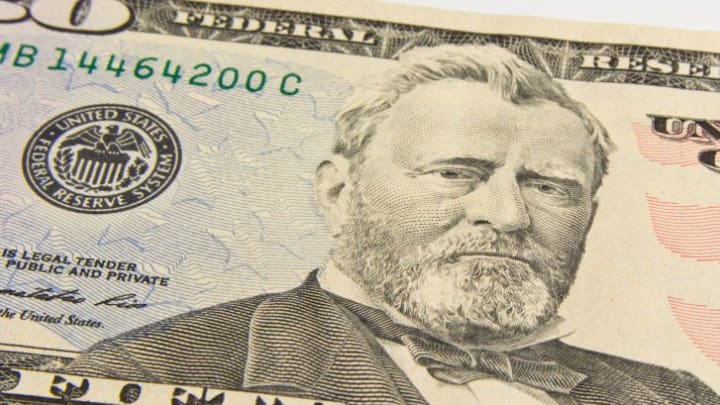
While Grant was never personally involved in any of the wrongdoing while in office, he had a knack for being associated with impropriety. Early on, gold speculators James Fisk and Jay Gould tried to manipulate the market by influencing the government, causing a mass panic on September 24, 1869, that came to be known as Black Friday. Because Grant knew Fisk and Gould personally, the president came under scrutiny. Later, in 1875, Grant’s private secretary, Orville Babcock, was involved in the Whiskey Ring, a network of alcohol distributors that conspired to avoid paying the government liquor tax revenue. Despite these gaffes, Grant was a proponent of civil service reform and established a civil service commission to examine the fair hiring and termination of workers. (Congress, unfortunately, withheld funding .)
6. Ulysses S. Grant toured the world.
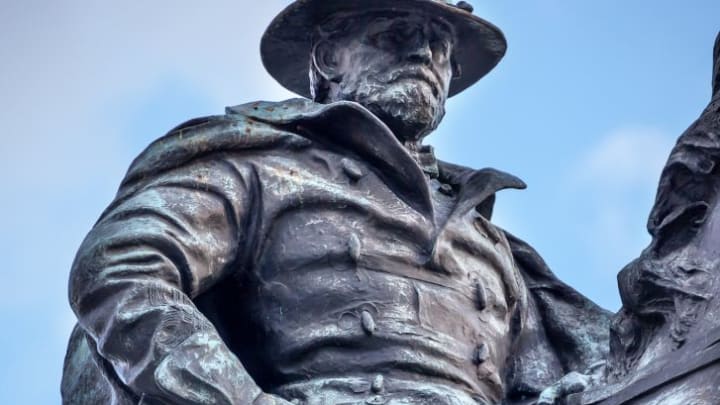
Following his two terms as president, Grant, his wife Julia, and their youngest son, Jesse, decided to embark upon an ambitious world tour that would take two and a half years. Departing from Philadelphia in 1877, the Grant family traveled with New York Herald reporter John Russell Young. The first stop was England, where they visited Queen Victoria at Windsor Castle. Though cordial, the Queen was famously irritated that Jesse, 19, had come along, describing him as a "very ill-mannered young Yankee." The Grants also made their way through Western Europe, then to Egypt, Greece, Rome, Russia, Austria, Germany, Burma, Singapore, and Vietnam, before returning to America on December 16, 1879.
7. Ulysses S. Grant got help from Mark Twain for his memoirs.

Following his two terms as president, Grant decided to start a career in investment banking, but the firm he was involved in wound up being disreputable. Turns out, his partner, Ferdinand Ward, was embezzling money from his clients and partners, including Grant and his son Buck. Broke and newly diagnosed with throat cancer, Grant turned to his sole remaining source for funds—writing his memoirs.
When he was going to sign a publishing deal that would award him 10 percent royalties, his friend Mark Twain, who Grant had grown close to after several meetings during and after his presidency, was appalled. Twain offered to publish the memoirs at Charles L. Webster & Co., the publishing house he established in 1884. The new royalty rate would be 20 percent, and Twain gave Grant $1000 for living expenses (the former president wouldn't accept a bigger advance out of fear that his book would lose money for Twain).
Twain supervised Grant's writing, and on July 20, 1885, the memoirs were finally finished. Grant died just three days later. When The Personal Memoirs of Ulysses S. Grant was released that December, it was a resounding success and acted as a kind of inheritance for his widow, Julia. She earned $450,000 in royalties from sales of the book.
Famous Ulysses S. Grant Quotes
- “Although a soldier by profession, I have never felt any sort of fondness for war, and I have never advocated it, except as a means of peace.”
- “Labor disgraces no man; unfortunately, you occasionally find men who disgrace labor.”
- “I don't underrate the value of military knowledge, but if men make war in slavish obedience to rules, they will fail.”
- “In every battle there comes a time when both sides consider themselves beaten, then he who continues the attack wins.”
- “To maintain peace in the future it is necessary to be prepared for war.”
Help inform the discussion
U.S. Presidents / Ulysses S. Grant
1822 - 1885
Ulysses s. grant.
It was my fortune, or misfortune, to be called to the office of Chief Executive without any previous political training. Eighth Annual Message
Ulysses S. Grant is best known as the Union general who led the United States to victory over the Confederate States of America during the American Civil War. As a two-term President, he is typically dismissed as weak and ineffective; historians have often ranked Grant's presidency near the bottom in American history. Recently, however, scholars have begun to reexamine and reassess his presidential tenure; recent rankings have reflected a significant rise.
Life In Depth Essays
- Life in Brief
- Life Before the Presidency
- Campaigns and Elections
- Domestic Affairs
- Foreign Affairs
- Life After the Presidency
- Family Life
- Impact and Legacy

Chicago Style
Miller Center of Public Affairs, University of Virginia. “Ulysses S. Grant.” Accessed April 09, 2024. https://millercenter.org/president/grant.
Professor of History
Professor Waugh is a professor of history at the University of California, Los Angeles.
- U.S. Grant: American Hero, American Myth
- War within a War: Controversy and Conflict over the American Civil War
- The Memory of the Civil War in American Culture
Featured Insights
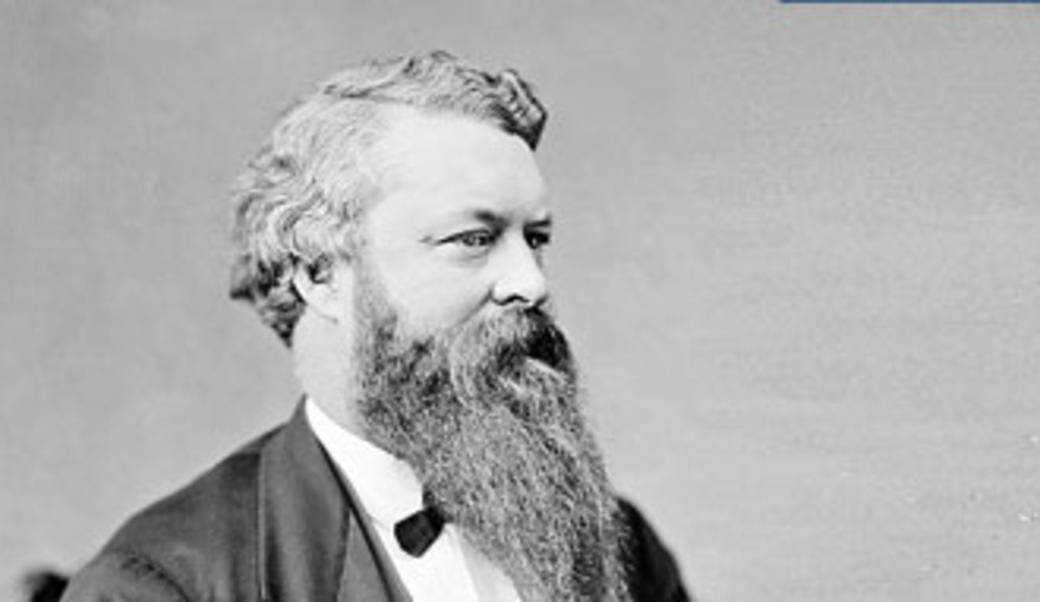
Resignation was not the end
President Ulysses S. Grant's secretary of war, William W. Belknap, was impeached and he resigned, but the US Senate went ahead with his trial
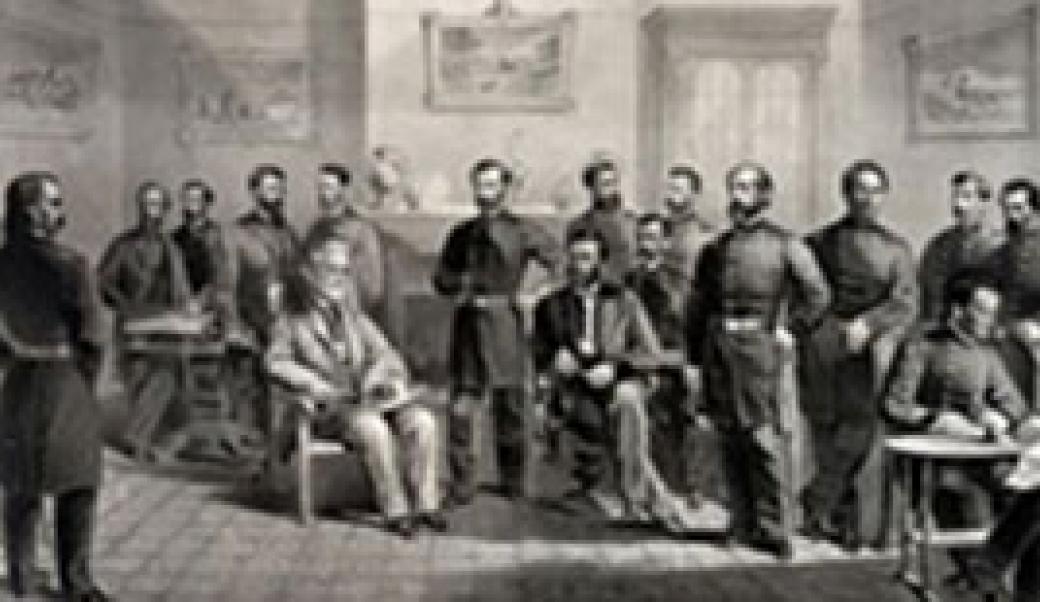
President Grant: A case of misfortune?
Learn why scholars are re-examining Grant’s presidency

The "General" election: Ulysses S. Grant
Learn more about how General Grant, who had no political experience, got elected
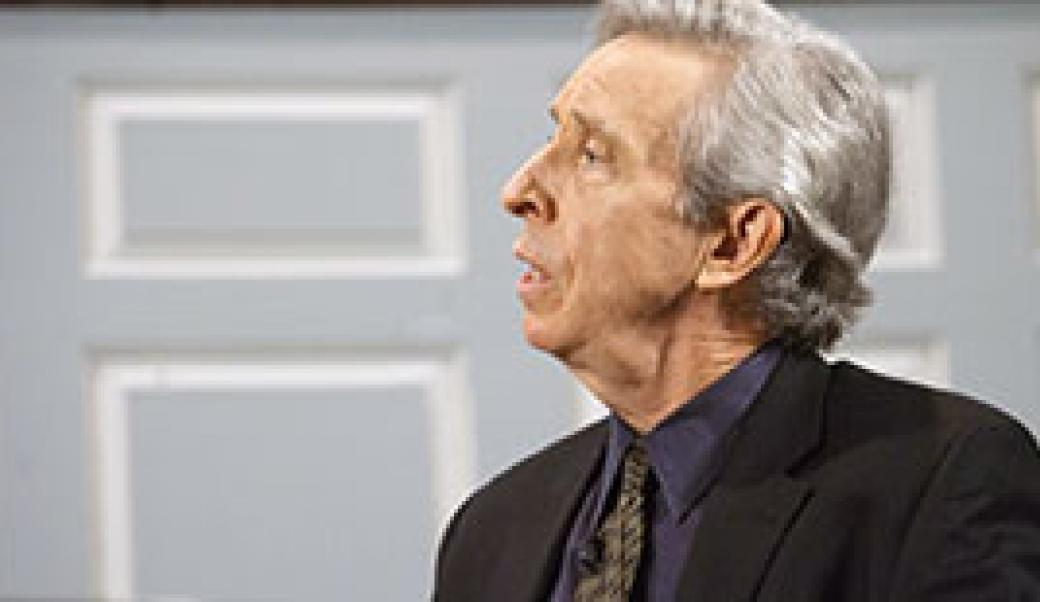
Why remember the Civil War?
Historian Gary Gallagher discusses why the Civil War still holds such a grip on the American imagination 150 years later and what we most need to remember from that conflict
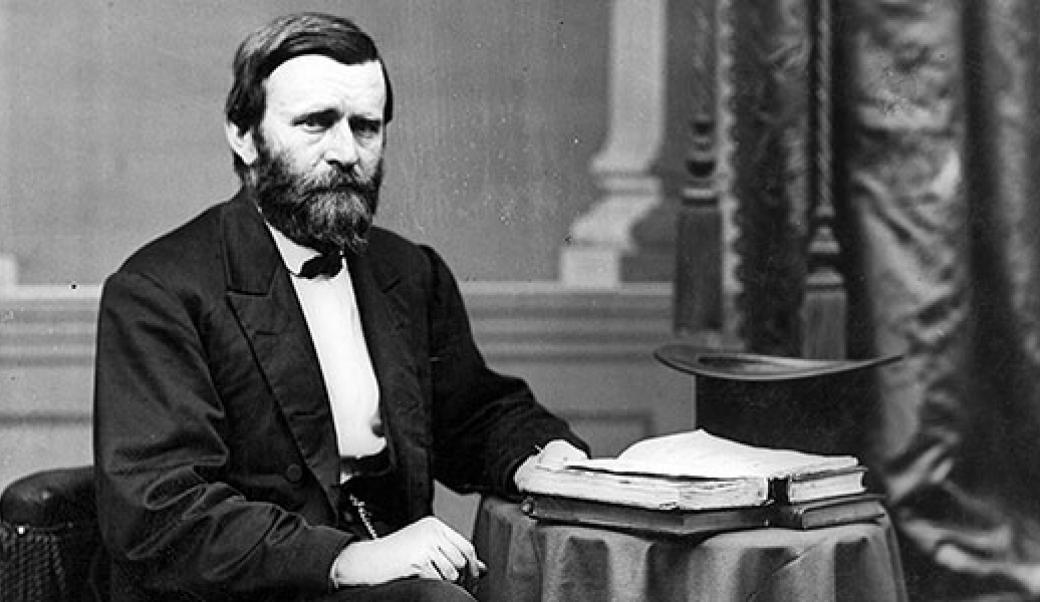
March 4, 1869: First Inaugural Address
January 13, 1875: message regarding intervention in louisiana, december 5, 1876: eighth annual message, featured video.

U.S. Grant and the crisis of Reconstruction
Watch Joan Waugh, professor in the UCLA history department, talk about the crisis of Reconstruction
Featured Publications
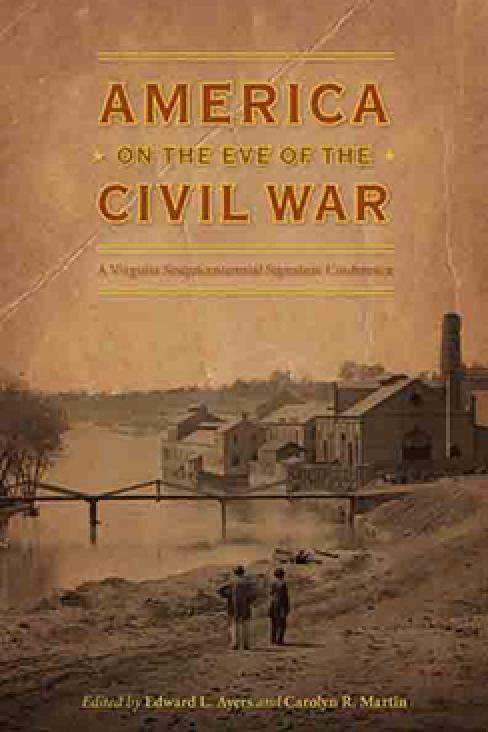
Ulysses S. Grant
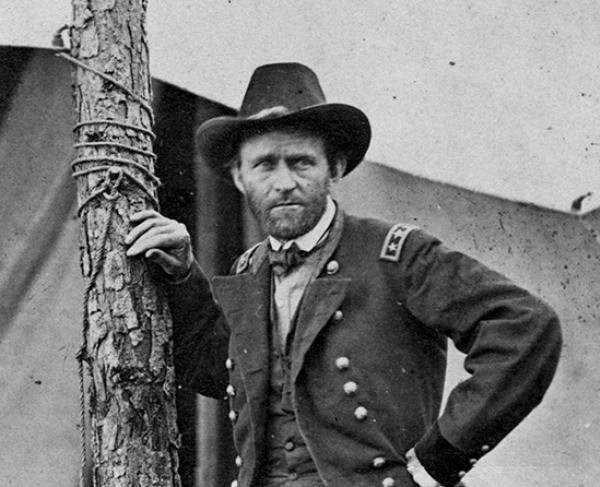
Born Hiram Ulysses Grant, in Point Pleasant, Ohio, the future General-in-Chief's name was changed due to a clerical error during his first days at the United States Military Academy at West Point. To his friends, however, he was known simply as "Sam." After a mediocre stint as a cadet, he graduated twenty-first out of the thirty-nine cadets in class of 1843. Yet despite his less than exemplary school record, he performed well as a captain during the Mexican War (1846-1848), winning two citations for gallantry and one for meritorious conduct. Only when the fighting stopped and Grant was assigned monotonous duties at remote posts far from his wife and family did he again begin neglecting his work and drinking heavily. He resigned in 1854 to avoid being drummed out of the service.
Grant spent the next six years in St. Louis, Missouri with his wife, Julia Dent Grant. After several short-lived pursuits, including a brief episode as a farmer, he moved to Galena, Illinois to be a clerk in his family's store. When the Civil War began in 1861, he jumped at the chance to volunteer for military service in the Union army. His first command was as the colonel of the 21st Illinois Infantry, but he was quickly promoted to brigadier general in July 1861, and in September was given command of the District of Southeast Missouri.
His 1862 triumphs at Fort Henry and Fort Donelson in western Tennessee won him the nickname “Unconditional Surrender” Grant, and placed him before the public eye. However, when a surprise attack by Confederate forces at the Battle of Shiloh yielded devastating casualties during the first day's fighting, President Abraham Lincoln received several demands for Grant's removal from command. Nevertheless, Lincoln refused, stating, “I can’t spare this man. He fights.” The following day, Grant's Army - bolstered by troops under Maj. Gen. Don Carlos Buell - fended off Confederate advances and ultimately won the day.
Grant’s hard-won victory at Vicksburg , Mississippi, in May of 1863 was a strategic masterpiece. On May 1, 1863, Grant's army crossed the Mississippi River at the battle of Port Gibson. With Confederate forces unclear of his intentions, Grant sent a portion of his army under Gen. William T. Sherman to capture the state capital, Jackson, while setting his sights on Vicksburg with a view toward permanently closing the Confederate supply base. When initial assaults on the city demonstrated the strength of Vicksburg's defenses, the Union army was forced to lay siege to the city. On July 4, 1863, after 46 days of digging trenches and lobbing hand grenades, Confederate general John Pemberton 's 30,000-man army surrendered. Coupled with the Northern victory at Gettysburg , the capture of Vicksburg marked the turning point in the war. It also made Grant the premier commander in the Federal army. Later that same year, Grant was called upon to break the stalemate at Chattanooga , further cementing his reputation as a capable and effective leader.
In March 1864, President Lincoln elevated Grant to the rank of lieutenant general, and named him general-in-chief of the Armies of the United States. Making his headquarters with the Army of the Potomac, Grant was determined to crush Robert E. Lee and his vaunted Army of Northern Virginia at any cost. Though plagued by reticent subordinates, petty squabbles between generals and horrific casualties, the Federal host bludgeoned Lee from the Rapidan River to the James in what one participant would later describe as "unspoken, unspeakable history." The battles of the Wilderness , Spotsylvania , Cold Harbor and the subsequent siege of Petersburg effectively destroyed the rebel army, leading to the fall of Richmond and Lee's surrender at Appomattox Court House . Though Grant’s forces had been depleted by more than half during the last year of the war, it was Lee who surrendered in 1865.
After the Civil War, President Andrew Johnson named Grant Secretary of War over the newly reunited nation. In 1868, running against Johnson, Ulysses S. Grant was elected eighteenth President of the United States. Unfortunately, though apparently innocent of graft himself, Grant’s administration was riddled with corruption, and scandal.
For two years following his second term in office, Grant made a triumphal tour of the world. In 1884, he lost his entire savings to a corrupt bank. To make up some of his losses, he wrote about his war experiences for Century Magazine. They proved so popular that he was inspired to write his excellent autobiography, Personal Memoirs of U.S. Grant , finishing the two-volume set only a few days before dying of cancer at the age of sixty-three. Ulysses S. Grant is buried in New York City in the largest mausoleum of its kind in the United States. Reminiscent of Napoleon's tomb in Paris, Grant's tomb is a National Memorial.
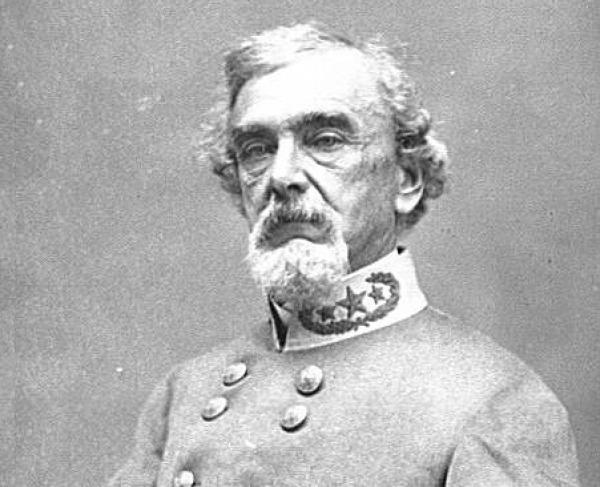
Benjamin Huger

Alexander Hays
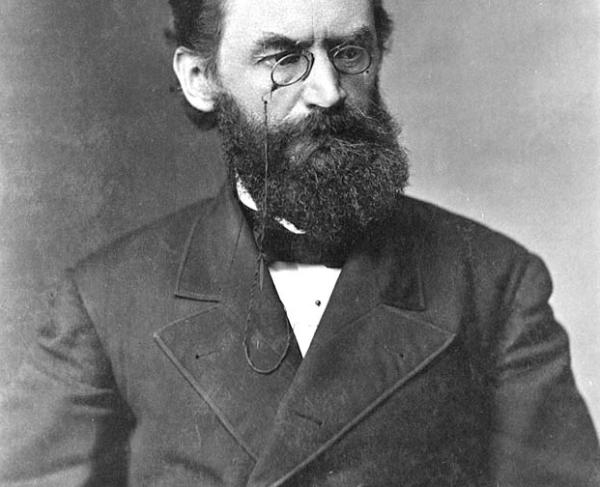
Carl Schurz
You may also like.
My Journey Through the Best Presidential Biographies

The Best Biographies of Ulysses S. Grant
30 Tuesday Sep 2014
Posted by Steve in Best Biographies Posts , President #18 - U S Grant
≈ 141 Comments
American history , biographies , book reviews , Geoffrey Perret , H.W. Brands , Jean Edward Smith , Josiah Bunting , presidential biographies , Ronald C. White , Ulysses S Grant , William McFeely
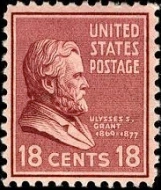
Despite the pivotal role he played in the Civil War and the importance of his administration to Reconstruction, I don’t recall spending any meaningful time studying Ulysses S. Grant in school.
My only brush with his presidency involved memorizing his name as one of the then-forty presidents during a high school trip to the Texas State History Fair. During that drive to Austin we had to do something. …so those of us on the trip decided to learn the presidents’ names in order. Sad, really.
When I finished reading a dozen biographies of Lincoln a couple months ago I assumed I would be in for a slow spell until my encounter with Teddy Roosevelt sometime early in 2015. Fortunately, Grant and his biographers proved me very wrong!
Ulysses Grant’s life story is astonishingly fascinating. There are certainly stretches of his life which proved dull and uneventful – and sometimes spectacularly unsuccessful. But biographers tended not to linger on those moments and taken as a whole, Grant’s sixty-three years are almost inspirational.
Grant certainly seems to prove the adage that you can’t judge a book by its cover. He was that kid we all knew who sat in the back of class, paid little attention to the day’s lesson, never had much to say and would befriend almost anyone who would make even a modest effort to get to know him. Incredibly unpretentious and modest, no one could have foreseen that Grant was destined to become a spectacularly successful military leader…and president of the United States.
A cursory review of the ebb and flow of Grant’s presidential legacy over time reveals a remarkable evolution in opinion. After a enjoying an early period of spirited acclaim, Grant’s reputation suffered within a few decades of leaving office and did not recover until the last two decades of the twentieth century. Each of the Grant biographies I read was published during this recent period of re-evaluation and each, save the first, judged his reputation unfairly tarnished.
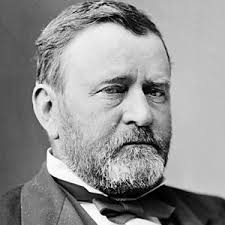
In addition, McFeely is well-known for his negative opinion of Grant. Although I could not detect it at the time without broader exposure to Grant, McFeely’s perspective of the general now seems flawed and unreasonably jaundiced. I can’t recall a single mention of praise or adoration toward Grant…but surely there must have been one somewhere.
Possibly more important to me than objectivity is writing style. After all, I’m seeking the best and most enjoyable presidential biographies; thoughtful and transparent bias can be tolerated. But McFeely’s writing style is anything but smooth and fluid. Important messages, except those key to his take-down of Grant, have to be teased from the text and when something could be said clearly, McFeely often seems to choose a more abstruse path. ( Full review here )
* Next was Geoffrey Perret’s 1997 “ Ulysses S. Grant: Soldier & President .” Often described as fatally riddled with factual errors, I found Perret’s survey of Grant’s life much more interesting than McFeely’s. Although the errors I spotted (or read about) are generally minor and of relatively little consequence to most readers, they would be acutely annoying to a professional historian.
But my issue with Perret’s book is that it seems too casual at times – and filled with excessive hyperbole. And in contrast to McFeely, who was reluctant to praise Grant, Perret is liberal with applause. But overall, the biography is captivating, a bit provocative and capable of holding my attention to the very end. ( Full review here )
* My third Grant biography was Brooks Simpson’s 2000 “ Ulysses S. Grant: Triumph Over Adversity, 1822-1865 .” This was the first in an anticipated two-volume series and covers Grant’s life only through the end of the Civil War. Simpson’s analysis is more sober and serious than Perret’s but more forgiving (and balanced) than McFeely’s. But because the second volume to this series has never appeared, Simpson’s coverage of Grant is restricted to his pre-presidency and is therefore incomplete. ( Full review here )
* My next biography was “ Grant ” by Jean Edward Smith. Published in 2001, this was the biography of Grant I had been waiting for. This book starts off with a bang – six or eight of the most thoughtful and potent introductory pages to a presidential biography I’ve seen – and rarely slows down from there.
For the first three-fourths of the book (until Grant’s presidency) I could not put this biography down. Smith’s narrative is fluid, colorful, captivating and insightful. The Mexican War comes to life in a way that even Zachary Taylor’s biographers could not match, and Smith’s review of Grant and the Civil War is excellent.
Only Grant’s presidential years slow the book’s pace (there’s little a biographer can do about this, I’m afraid) and the book ends far too abruptly. Given Jean Edward Smith’s excellent introduction, I’m surprised the book’s conclusion isn’t equally penetrating and revealing. But while reading this book I quickly knew I had found a favorite, and the imperfect ending did little to upset that view. ( Full review here )
* Fifth on my list was Josiah Bunting’s 2004 “ Ulysses S. Grant .” A member of The American Presidents Series , this biography is exactly what you would expect: short, straightforward and entirely comprehensible. Nearly every important message about Grant’s life is provided and nearly every crucial detail is included. Left behind, of course, is much of the nuance and flavor of Grant’s life – the granularity that makes his story really come to life.
Although geared toward an impatient reader and excellent for such a concise biography, I can’t help but believe that anyone who appreciates this book would find Jean Edward Smith’s biography even more compelling – despite the extra pages. But for readers committed to a balance of brevity and insight, Bunting’s biography of Grant succeeds remarkably well. ( Full review here )
* Finally, I read H.W. Brands’s 2012 “ The Man Who Saved the Union: Ulysses S. Grant in War and Peace .” As the sixth biography of Grant I had read in as many weeks I feared there was little new I could learn about Grant unless Brands uncovers something unique about Grant. He does not, and I felt as though I was re-reading much of what Bunting, Smith and Simpson had previously written.
What is different is Brands’s writing style, but not the substance of what is put on the page. Other than simply fulfilling a desire to write about Grant, I’m not sure of this biography’s raison d’être. In many respects, coming so late in the Grant renaissance and with little new to say, this seems just another sympathetic and thoughtful biography.
And although it lacks the fluidity and narrative charm of Jean Edward Smith’s biography, the drama of Perret’s and the brevity of Bunting’s, Brands’s biography of Grant is comprehensive, methodical, deliberate and objective. ( Full review here )
– – – – – – –
–>On my “Ulysses Grant follow-up list” (yes, it already exists) I am including Grant’s Memoirs as well as the three-volume Lewis/Catton series. Oh…and Ron Chernow’s upcoming biography of Grant as well!
[ Added April 2019 ]
* Two years after I completed my initial round of reading related to Ulysses Grant, Ronald White’s “ American Ulysses: A Life of Ulysses S. Grant ” was published. Between late March and early April 2019 I finally had an opportunity to read this highly-anticipated and well-regarded biography.
While I found “American Ulysses” to be good, it’s not quite great . White is the first biographer afforded access to the complete collection of “The Papers of Ulysses S. Grant” and yet there is relatively little which stands out as particularly new or revelatory.
Jean Edward Smith’s narrative is more colorful, engaging and insightful. Bunting’s biography packs more “punch” in far less space. And Brooks Simpson’s treatment of Grant’s pre-presidency probably provides the most detailed (if not exciting) exploration of Grant’s early life.
To his great credit, White includes an extensive collection of invaluable charts and diagrams in this biography, and his positive reassessment of Grant’s image is compelling. But the narrative is probably a better historical work than a literary one, and Grant’s personality is never fully dissected.
As a comprehensive, and certainly more-than-satisfactory, review of the life of Ulysses S. Grant this biography succeeds. But for anyone who has already navigated Grant’s life there is probably not enough new insight or analysis to make this a truly compelling read. ( Full review here )
[Added June 2020]
* Three years after I completed my initial journey through the best biographies of Grant, Ron Chernow’s “ Grant ” was published. By far the longest of the Grant biographies I’ve read, it is also one of the very best.
Some have argued that Chernow’s biography is late in the “rehabilitation” game for the 18th president and that nothing new is revealed. I am somewhat sympathetic with this argument; the dust jacket claims Grant’s life “has typically been misunderstood” but Chernow is hardly the first biographer to reveal the more nuanced Grant. And no bombshell revelations appear in this book.
But this biography provides a far more fulsome, vivid and nuanced portrait of Grant than the more concise reviews of his life found elsewhere and Chernow undertakes a more exhaustive and thoughtful exploration of Grant’s alleged alcoholism than I’ve seen.
Casual consumers of presidential history may be inclined to turn to shorter treatments of Grant’s life; in that case, Jean Edward Smith’s biography of Grant is an excellent alternative (and a fantastic choice in any case). But anyone with a keen interest in Ulysses Grant – or who revels in Ron Chernow’s literary fluency – will want to read this excellent biography. ( Full review here )
– – – – – – – – – – –
Best Biography of Ulysses S. Grant: tie between ————–> Jean Edward Smith’s “ Grant ” (2001) and ————–> Ron Chernow’s “ Grant ” (2017)
Share this:
141 thoughts on “the best biographies of ulysses s. grant”.
August 4, 2023 at 2:25 pm
I thought the Smith biography far superior to the Chernow book. Although a Grant partisan when I read the McFeely biography (and an even stronger one today) I found his critical tone toward Grant to be fair; though if one compares Grant to nearly every other man who held the Presidency McFeely’s criticism seem ridiculous. Grant was one of perhaps three men elected President without requiring to be associated with a particular political party (the other two being Washington and Eisenhower, though Grant would have needed the Republican Party more than the other two, with Eisenhower having the freest hand to choose) and in comparison to nearly every other President Grant’s personal policy choices (except the Dominican Republic affair) where largely just and honorable while the policy areas where he was inclined to follow his advisors were no worse than those made by other Presidents who relied on such advice. Those actions were only made to seem worse because the Lost Cause and anti-Reconstruction contingent had to denigrate Grant the Man to justify their cruel and evil opinions.
December 4, 2023 at 3:10 pm
Question about the concluding sentence:
But anyone with a keen fascination in Ulysses S. Grant – or who revels in Ron Chernow’s literary fluency – will want to pass on this excellent biography.
Is that supposed to be “will NOT want to pass”?
December 4, 2023 at 3:13 pm
You are correct – thanks!
Leave a comment Cancel reply

- Already have a WordPress.com account? Log in now.
- Subscribe Subscribed
- Copy shortlink
- Report this content
- View post in Reader
- Manage subscriptions
- Collapse this bar
Ulysses S. Grant
View a detailed chronology of Grant’s life, from birth to death.

72 pages • 2 hours read
A modern alternative to SparkNotes and CliffsNotes, SuperSummary offers high-quality Study Guides with detailed chapter summaries and analysis of major themes, characters, and more.
Chapter Summaries & Analyses
Key Figures
Index of Terms
Important Quotes
Essay Topics
Discussion Questions
Summary and Study Guide
Ron Chernow’s biography of Ulysses S. Grant, titled simply Grant , was published in 2017 by Penguin Press. A biographer specializing in United States history, Chernow wrote Grant in order to correct what he perceives as misconceptions about Grant’s life, especially his presidency. In particular, Chernow argues that Grant was a more pivotal figure when it came to African American rights than has usually been appreciated. Also, Chernow focuses on Grant’s alcoholism, seeing Grant’s struggle with alcohol as inspirational rather than a fatal flaw.
This study guide refers to the 2018 Penguin Books edition.
Get access to this full Study Guide and much more!
- 7,400+ In-Depth Study Guides
- 4,950+ Quick-Read Plot Summaries
- Downloadable PDFs
The biography of Ulysses S. Grant starts in rural Ohio, where Grant is born to a family with a Methodist and abolitionist background. His father Jesse enlists him in the military academy of West Point without Grant’s knowledge or consent. There, Grant was a student who talked back to superiors, but one who also “developed a reputation for a fearless sense of fair play” (22). Although Grant aspired to be a professor of mathematics, he ended up pursuing a career in the military, serving as an officer in the Mexican-American War where he had firsthand experience as part of an occupying army. Still, he had time for a personal life and married Julia Dent, the daughter of a family of enslavers from Missouri. Grant’s career in the military was cut short when he resigned from the army, possibly because of his alcoholism.
The SuperSummary difference
- 8x more resources than SparkNotes and CliffsNotes combined
- Study Guides you won ' t find anywhere else
- 100+ new titles every month
When the Southern states tried to secede from the United States in response to the election of President Abraham Lincoln , it sparked the American Civil War . The Southern states moved to form their own government, the Confederacy. Committed to the Union side despite his father-in-law, Colonel Frederick Dent, being an avid Confederate, Grant rejoined the military. Throughout the war, Grant deployed a “swift, relentless military style” (344) that distinguished him from Lincoln’s other, more overly cautious generals. He rose through the ranks until Lincoln entrusted him with full command of the Union army. With the full force of the Union army at this disposal, Grant cornered the famous Confederate general, Robert E. Lee , and forced him to surrender at Appomattox Court House, which brought an end to the Civil War and to slavery in the United States. After the war ended, a period of trying to reintegrate the South, Reconstruction, began. Following the assassination of President Lincoln, the process of Reconstruction was marred by a clash between Lincoln’s successor, Andrew Johnson , who held racist views and sympathized with the plantation owners who once controlled the South, and the Radical Republicans , a faction in Johnson’s own Republican party who wanted to extend civil rights to African Americans in the South.
Due to his fame as a general, Grant was nominated to run for president in the next election as the Republican Party’s nominee. Grant came to believe that his mission was to complete the work of Reconstruction and “settle unfinished business from the war” (654). He supported extending and protecting civil rights for African Americans in the South and using federal soldiers against the racist vigilante groups that had emerged, the most notorious of which was the Ku Klux Klan . In this work, Grant was successful in breaking up the original incarnation of the Ku Klux Klan. However, much of his work was undone or weakened by public opinion in the North, which swung toward sympathy for the South, and persistent violence and entrenched racism within the Confederacy. In addition, Grant’s presidency was marred by a series of scandals caused by corrupt officials in whom he had put too much trust.
After the end of his second term as president, Grant went on a tour of the United States and the world. Later, he made an unsuccessful bid to run for the presidency a third time. Forced into retirement, he and his family lost much of their money to a business scam. In order to make sure his wife Julia would have an income, Grant wrote a memoir . At the same time, he was diagnosed with throat cancer. With the support of the legendary writer Mark Twain, Grant finished his memoir, not long before his death on July 23, 1885.

Don't Miss Out!
Access Study Guide Now
Related Titles
By Ron Chernow

Alexander Hamilton
Ron Chernow

Titan: The Life of John D. Rockefeller, Sr.
Featured Collections
9th-12th Grade Historical Fiction
View Collection
American Civil War
Books on U.S. History
Inspiring Biographies
Jewish American Literature
New York Times Best Sellers
Political Science Texts
Politics & Government
Popular Study Guides
The Best of "Best Book" Lists

IMAGES
VIDEO
COMMENTS
Ulysses S. Grant (born April 27, 1822, Point Pleasant, Ohio, U.S.—died July 23, 1885, Mount McGregor, New York) was a U.S. general, commander of the Union armies during the late years (1864-65) of the American Civil War, and the 18th president of the United States (1869-77).. Early life. Grant was the son of Jesse Root Grant, a tanner, and Hannah Simpson, and he grew up in Georgetown, Ohio.
Ulysses S. Grant (born Hiram Ulysses Grant; April 27, 1822 - July 23, 1885) was an American military officer, politician, and the 18th president of the United States, who served from 1869 to 1877.As commanding general, Grant led the Union Army to victory in the American Civil War in 1865 and briefly served as U.S. secretary of war.An effective civil rights executive, Grant signed a bill to ...
Ulysses S. Grant was entrusted with the command of all U.S. armies in 1864 and relentlessly pursued the enemy during the Civil War. In 1869, at age 46, Grant became the youngest president in U.S ...
Ulysses Grant (1822-1885) commanded the victorious Union army during the American Civil War (1861-1865) and served as the 18th U.S. president from 1869 to 1877.
Brief Overview. When Hiram Ulysses Grant was born, his home state of Ohio was the "far West." Soon after Grant's birth, his father, Jesse R. Grant, moved the family to nearby Georgetown, where he opened a tannery. Growing up, Grant found that he hated the tannery business, but also found that he had a unique ability to work with horses.
By Joan Waugh. Ulysses S. Grant is best known as the Union general who led the United States to victory over the Confederate States of America during the American Civil War. As a two-term President, he is typically dismissed as weak and ineffective; historians have often ranked Grant's presidency near the bottom in American history.
In 1865, as commanding general, Ulysses S. Grant led the Union Armies to victory over the Confederacy in the American Civil War. As an American hero, Grant was later elected the 18th President of ...
The two married in June of 1821, and their first born, Hiram Ulysses Grant, was born on April 27, 1822. It was only later when the congressman who nominated him for West Point erroneously recorded him as Ulysses S. Grant that he was able to shed the embarrassment of his true initials: H.U.G. Grant's father sent him to the United States ...
Fresh off his victory as commander of the Union armies during the Civil War, Ulysses S. Grant (1822-1885) became President of the United States in March 1869. While his time in office wasn't ...
Scholarly essays, speeches, photos, and other resources on Ulysses S. Grant, the 18th US president (1869-1877), including information about the Civil War, Reconstruction, and writing his memoirs
He fights." The following day, Grant's Army - bolstered by troops under Maj. Gen. Don Carlos Buell - fended off Confederate advances and ultimately won the day. Grant's hard-won victory at Vicksburg, Mississippi, in May of 1863 was a strategic masterpiece. On May 1, 1863, Grant's army crossed the Mississippi River at the battle of Port Gibson.
Ulysses S. Grant by Balling (1865). Ulysses S. Grant was a native of Ohio, born in 1822. After graduating from West Point in 1843 he served in the Mexican-American War. In 1848, Grant married Julia, and had four children.He resigned from the Army in 1854. Upon the start of the American Civil War, Grant returned to the Army in 1861.As a successful Union general, Grant led the Union Armies to ...
Visit other websites about Grant, the Civil War and Reconstruction, and other presidential libraries. "Although a soldier by profession, I have never felt any sort of fondness for war, and I have never advocated it, except as a means of peace." Biography Read about Grant's life. Chronology See a detailed timeline of the major events of Grant ...
Continue your study of Ulysses S. Grant with these useful links. Test. Study Questions. Suggestions for Further Reading. Essay Topics. Read a comprehensive biography of Ulysses S. Grant's life, including major events, key people and terms, and important achievements.
Ulysses S. Grant was the most acclaimed Union general during the American Civil War and was twice elected president. Grant began his military career as a cadet at the United States Military Academy at West Point in 1839. After graduation he went on to serve with distinction as a lieutenant in the Mexican-American War.Grant was a keen observer of the war and learned battle strategies serving ...
But for readers committed to a balance of brevity and insight, Bunting's biography of Grant succeeds remarkably well. (Full review here) - * Finally, I read H.W. Brands's 2012 "The Man Who Saved the Union: Ulysses S. Grant in War and Peace." As the sixth biography of Grant I had read in as many weeks I feared there was little new I ...
On April 27, 1822, Ulysses S. Grant was born in Point Pleasant, Ohio. Grant's father, Jesse, was a tanner and an abolitionist. Grant received an education from several private schools and la...
Grant, Ulysses S, John F. Marszalek, David S. Nolen, and Louie P. Gallo. Cambridge, Massachusetts: The Belknap Press of Harvard University Press, 2017. With a preface by Frank J. Williams. President Ulysses S. Grant (1822-1885) was one of the most esteemed individuals of the nineteenth century. His two-volume memoirs, sold door-to-door by ...
View a detailed chronology of Grant's life, from birth to death.
Subscribe for $3 a Month. Summary. The biography of Ulysses S. Grant starts in rural Ohio, where Grant is born to a family with a Methodist and abolitionist background. His father Jesse enlists him in the military academy of West Point without Grant's knowledge or consent. There, Grant was a student who talked back to superiors, but one who ...